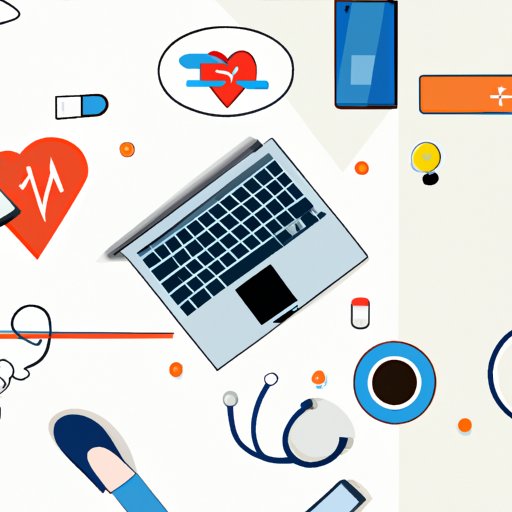Introduction
It’s no secret that technology has had a profound impact on our lives in the 21st century. From communication to education, from healthcare to entertainment, technology has revolutionized nearly every aspect of modern life. But what exactly is technology? According to the Oxford English Dictionary, technology is “the application of scientific knowledge for practical purposes, especially in industry.” In other words, it’s the use of scientific knowledge and tools to make everyday tasks easier, faster, and more efficient.
In this article, we’ll explore how technology has changed our lives in various ways. We’ll look at its effects on education, workplace efficiency, social media usage, healthcare, and communication. By the end, you’ll have a comprehensive understanding of how technology has transformed our lives over the past few decades.
How Technology Has Changed Education
The way we learn has changed significantly since the introduction of digital technologies. Students now have access to vast amounts of information online, which makes research and learning more efficient than ever before. According to a study by the Pew Research Center, 95% of teens have access to a smartphone or computer, and 45% say they are online almost constantly.
Technology also allows teachers to create more engaging learning experiences. Instead of relying solely on textbooks, teachers can use interactive media such as videos, animations, and simulations to teach complex concepts. Additionally, virtual reality (VR) is being used in classrooms to provide students with immersive, hands-on learning experiences. A study by the University of Maryland found that VR can improve student engagement and performance in science classes.

The Impact of Technology on Workplace Efficiency
Technology has also had a major impact on workplace efficiency. Automation of tasks is one of the most significant changes we’ve seen in recent years. Machines can now perform many of the routine tasks that were once done by humans, freeing up time for more important work. According to a study by McKinsey Global Institute, automation could increase productivity by up to 30%.
Technology has also improved communication in the workplace, making it easier for people to collaborate and share ideas. Tools like instant messaging, video conferencing, and cloud storage make it possible for teams to communicate quickly and effectively. A study by Harvard Business Review found that companies that use these tools are 2.5 times more likely to be high performing.
The Pros and Cons of Social Media Usage
Social media is one of the most popular uses of technology today, and it has both positive and negative effects on our lives. On the positive side, social media can help us stay connected with friends and family, and it can be a great source of news and information. It can also be a platform for self-expression and creativity. A survey by the Pew Research Center found that 73% of adults use social media, and 59% said it had a mostly positive effect on their lives.
However, there are also some potential downsides to social media use. Excessive use can lead to feelings of isolation, depression, and anxiety. It can also be a source of cyberbullying and other forms of harassment. A study by Common Sense Media found that 48% of teens feel addicted to their devices, and 41% feel overwhelmed by the amount of online drama they experience.

The Role of Technology in Healthcare
Technology has had a huge impact on healthcare as well. Over the past decade, we’ve seen a shift toward more personalized, data-driven treatments. Improved diagnostics allow doctors to detect diseases earlier and more accurately, while remote monitoring systems allow patients to track their health data in real time. A study by the American Medical Association found that the use of these technologies can improve patient care and reduce costs.
We’ve also seen a rise in the use of robotics and artificial intelligence in healthcare. Robotic surgery is becoming increasingly common, and AI-powered chatbots are being used to provide medical advice. A study by the Journal of Medical Internet Research found that these technologies can help provide more efficient and accurate diagnoses.

How Technology is Changing the Way We Communicate
Technology has also had a major impact on the way we communicate. The widespread adoption of mobile devices has made it easier than ever to stay in touch with friends and family. According to a study by the International Telecommunication Union, there are now more than 4 billion mobile phone users worldwide.
We’re also seeing a shift away from face-to-face interaction. Online messaging and video chatting have become increasingly popular, and many people prefer to communicate through text rather than talking in person. A study by the American Psychological Association found that people who use technology to communicate are more likely to express emotions more openly than those who don’t.
Conclusion
In conclusion, technology has had a dramatic impact on our lives in the 21st century. It has changed the way we learn, increased workplace efficiency, affected social media use, impacted healthcare, and transformed communication. To make the most of technology, it’s important to be aware of its potential benefits as well as its potential risks. By understanding the power of technology, we can harness its potential to create a better future for ourselves and for generations to come.
(Note: Is this article not meeting your expectations? Do you have knowledge or insights to share? Unlock new opportunities and expand your reach by joining our authors team. Click Registration to join us and share your expertise with our readers.)
